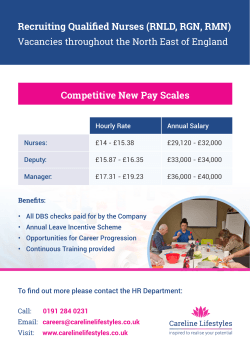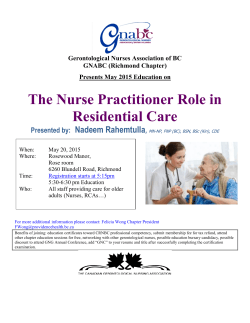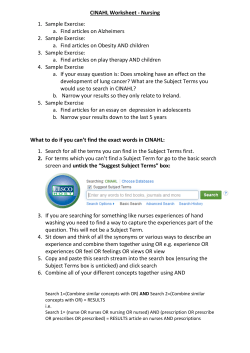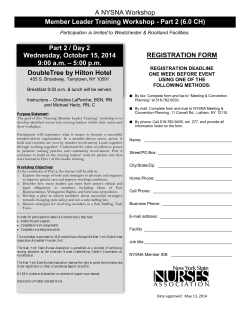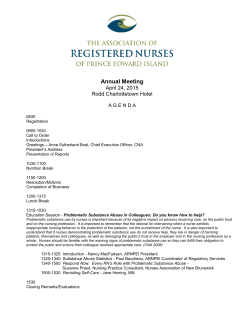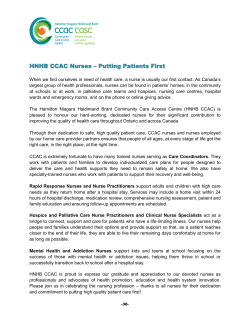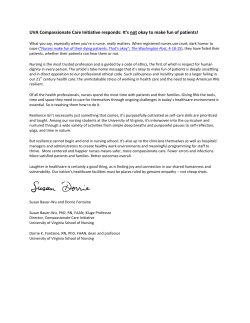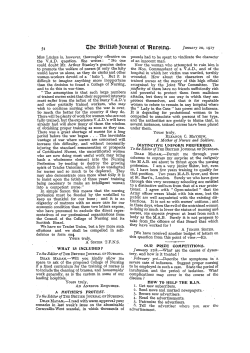
Jennifer gave birth safely thanks to our high
Cyan D1 magenta D1 yellow D1 black D1 The Gazette Wednesday, April 29, 2015 NATIONAL NURSES WEEK MAY 6-12, 2015 healthhappiness&harmony healthhappiness&harmony National Nurses Week begins each year on May 66th and ends on May 12th, Florence Nightengale’s birthday. These permanent dates enhance planning and position National Nurses Week as an established recognition event. How to show a nurse you care Nurses are often the first people patients see when visiting hospitals. According to the United States Department of Health and Human Services Health Resources Services Administration, there were 2.8 million registered nurses, including advanced practice RNs, and 690,000 licensed practical nurses, or LPNs, in the United States between the years of 2008 and 2010. particular you want to treat, give that nurse a gift card to a nearby restaurant. Nurses fill many roles in the medical community, assisting doctors and helping to make in-patient stays more comfortable for men and women who are ill or injured. Specialized nurses, such as nurse practitioners, may even serve as the primary healthcare provider, offering diagnoses and writing prescriptions. Create a charmed existence. Charm bracelets are the rage right now, and nurses may appreciate a bracelet that highlights their career path with specific charms. For something they can wear on the job, treat nurses to a Steth-o-Charmª, which is a charm that slides securely onto stethoscopes. These charms come in many designs and can make for a memorable gift. While there is a specific week set aside to show appreciation to nurses, many people agree that they deserve recognition throughout the year. Any instance is a good time to give back to nurses, and the following are a few ways to honor the nurses in your life. Play caretaker to him or her. Nurses tend to the needs of others all the time, but some nurses do not get the respite they deserve. Those who want to show appreciation to a nurse who has helped them in their lives can present the nurse with a gift card for a massage and soothing spa treatment. Cater a meal. Offer to cater a meal at the hospital or medical office so that all nurses on staff can benefit. If there is one nurse in Provide foot relief. Nurses spend hours on their feet, and that can cause pain or stiffness throughout the body. Present a gift card to a store that specializes in comfort shoes or custom orthotics. A certificate for a pedicure or foot massage would no doubt be appreciated as well. Give a decorative badge reel. Nurses must wear identification or have swipe cards on their person to gain access to areas of hospitals. Many badges are standard items without any flare or style. A colorful or decorative badge reel can be a nice way to brighten up a nurse’s day. Give verbal or handwritten thanks. One of the easiest and most heartfelt ways to show your appreciation to nurses is to simply tell them how you feel. Offer a handwritten note or speak with a nurse in person. Such a simple gesture does not take much effort, but it is bound to make an impact. Nurses bring smiles to the faces of their patients. Find out how you can show your appreciation and garner a few smiles in return. Jennifer gave birth safely thanks to our high-risk OB team. At Summa, multidisciplinary specialists protect moms with complicated pregnancies. Giving birth stresses a woman’s heart. If she has decreased heart function, it’s potentially life threatening. That’s why Jennifer Meade turned to Summa perinatologist Dr. Angela Silber and our high-risk maternity team. “Jennifer’s pregnancy was dangerous due to her enlarged heart,” explained Dr. Silber. “Our maternal-fetal medicine, obstetrics, cardiac and anesthesia specialists worked together seamlessly to get her heart through the labor of labor.” “I felt safe the whole time,” said Jennifer. “I’m here today because of them.” If you’re looking for care this personal, learn more at summahealth.org/Jennifer or call us at (888) 906-9983. Cyan D1 magenta D1 yellow D1 black D1 D1 Cyan D2 magenta D2 yellow D2 black D2 D2 Wednesday, April 29, 2015 The Gazette NATIONAL NURSES WEEK MAY 6-12, 2015 healthhappiness&harmony healthhappiness&harmony National Nurses Week begins each year on May 66th and ends on May 12th, Florence Nightengale’s birthday. These permanent dates enhance planning and position National Nurses Week as an established recognition event. School nurses are often unsung heroes More men seeking nursing careers Male nurses haven’t always been such a minority. Although men comprise only about 6 percent of today’s total nursing population in the United States, nursing schools for men were actually quite common and about half of the nation’s paid nurses were male during the early 1900s. By 1930, however, the percentage of male nurses dropped to a meager 1 percent, as men fled the profession for more lucrative occupations. That was the case for several decades, until the late 1980s, when inflation, nursing shortages, a rise in nursing salaries, and shifting attitudes about gender combined to attract new generations of men to the profession. Research indicates that men and women enter the profession for the same reasons. Both men and women are interested in working with sick and injured people and they are seeking careers that offer challenges, reasonable job security and good salaries. And with many parts of the United States and other western nations facing nursing shortages that are expected to peak in the mid-2020s, when much of the current generation of nurses will retire, men will have a vital role to play in filling those gaps. Some researchers have even predicted that the nation’s ability to handle the projected shortage of nurses hinges on strong increases in the number of males entering the profession. While the number of men in nursing programs is growing, the public perception of male nurses, which has unfairly carried a negative connotation through the years, persists and continues to keep them away from the field. Many male nurses also recount stories of patients assuming they are doctors or asking why they had decided against attending medical school — as if being a nurse was a fallback position rather than a first choice. Others note that the scarcity of male role models, instructors and mentors has made it more difficult not only to enter the profession but also to advance their careers. At the same time, nursing schools and organizations have launched initiatives aimed at recruiting men, and these efforts are paying off, albeit slowly. The population of male nurses is increasing by roughly 2 to 3 percent each year and it has More and more men are entering the field of nursing. been predicted that by 2020, males nurses will make up about 25 percent of the total nursing workforce. Another factor that may spur the increase in male nurses is age. On average, male nurses tend to enter nursing at a younger age than female nurses and therefore have the potential for longer careers. More information about men in nursing is available at the American Assembly for Men in Nursing Web site at aamn.org. Nursing trends show a profession in transition The healthcare industry is changing rapidly, and nurses, the largest group of healthcare professionals in the nation, are at the forefront of these changes. Despite the difficult economic conditions of recent years, nursing as a profession has thrived — particularly when compared to other professions. The Bureau of Labor Statistics predicts that job growth for nurses will continue to be more rapid than the national average, making the profession among the best career choices available today. So what can nurses and those considering entering the field expect over the next decade? The demand for nurses will continue. According to the Bureau of Labor Statistics, there will be nearly 712,000 new nursing positions by 2020, making this profession the fastest growing occupation. One of the factors fueling the growth is the aging population, and there will be great demand for nurses who are trained in geriatrics and who are able to work in ambulatory (i.e., outpatient) settings. More nurses will work in outpatient settings, home healthcare, and nursing homes. The Bureau of Labor celebrating national NURSES WEEK Statistics also projects that hospital nursing jobs will grow much more slowly than jobs in outpatient facilities and home health care. This is due both to the growth of the aging population and the increase in the number of medical procedures done on an outpatient basis or in homes. Hospitals will increasingly require RNs to have fouryear degrees. Many hospitals have begun hiring only those nurses with BSN (Bachelor of Science in Nursing) degrees or providing incentives for their employees with two-year associate degrees to return to school to earn their BSNs. Similarly, many nurses with BSNs are heading back to the classroom to become master’s degree-level nurse practitioners. Nurses are getting younger and older. During the last decade, a variety of efforts were made to make nursing more attractive to younger people. As a result, the number of younger nurses (ages 23 to 26) has grown significantly. This is expected to help offset the mass retirement of nurses that is expected to occur between now and 2020. At the same time, more people are entering the profession later in their careers as a result of the proliferation of two-year and accelerated nursing programs that were developed largely to attract people from other fields. Nursing educators will be in demand as well. Nursing program faculty will be among the retirees who will leave the profession over the next decade and there is expected to be a shortage of nurse educators to take their places. Technology will continue to alter how nurses operate and learn. Come 2014, all medical records will be electronic, so nurses will be saying a final good-bye to their black pens and a big hello to keyboards and tablets. In hospitals, nurses will continue to rely on texting to relay messages or provide information to doctors. Technology, in the form of digital textbooks, mobile phone applications that access drug information and simulated online clinics, will continue to alter how nursing students learn. Thank You Nurses National Nurses Week May 6th - 12th Congratulations Nurse ALYSSA EIDAM You’re a Blessing to many and a Joy to us. Our public health nurses protect you and 174,000 other Medina County residents from disease and illness. Mom and Dad Folk Thank You, Nurse Carol Roberts for saving my older sister and my mom so I could love them and so I could be born! 330-723-9688 • www.medinahealth.org Katrina Barnes Thank You Nurse Carol Roberts for being brave enough to speak out and save our lives almost 15 years ago! Amy & Sara Barnes Youngsters may not recognize it, but school nurses provide a valuable service that can make a school day injury much easier to handle. School nurses do much more than apply bandages to playground scrapes. School nurses conduct vital health screenings and are often the security blanket for students who need special care during school hours. Despite all they do, school nurses are often the unsung heroes within the school community. School nurses certainly tackle their share of fevers, nosebleeds, cuts, and scrapes, but nurses play other pivotal roles as well, calling up moms and dads to pick up their sick sons and daughters, overseeing the school’s health policies and helping to ensure a safe school environment for students. In addition, the role of the school nurse has changed dramatically over the years. A school nurse may oversee vaccination schedules. He or she also may arrange for assemblies regarding “change of life” seminars for children about to enter puberty. When there is an epidemic at the school, the nurse is often charged with notifying staff and parents and helping to contain the situation. Apart from all of the tasks in treating “sick” children, nurses also are essential in helping to keep children with life-threatening diseases healthy while they are at school. The number of children with serious allergies, diabetes, asthma, and even seizure disorders has increased. According to the American Diabetes Association, roughly 1 in every 400 children and adolescents has diabetes. School nurses may help administer life-saving insulin shots to children who need them. According to Anaphylaxis Canada, 1 in 50 Canadian children has a peanut allergy, and about 1 to 2 percent of these can have severe or life-threatening reactions. School nurses may treat serious allergic reactions or provide a safe place where children with serious allergies can eat lunch. In some cases, school nurses become a mediator between home and school. Nurses may indirectly be teaching students as well. Each time the nurse treats a condition, he or she may be educating students on how to avoid that situation in the future. For example, a nurse may impart the importance of eating breakfast to avoid a morning headache or teach youngsters about the benefits of stretching before diving into physical education class. School nurses are often the unsung heroes of a school, wiping away tears when youngsters suffer an injury at school and acting as a reassuring voice when such injuries are painful. Your Complete Family Dentist. Providing quality care to our Medina area patients for over 20 years. Cosmetic Services • Implants • Root Canals • Crowns Gentle Dental Care for Children and Adults Evening and Weekend Appointments Available DENNIS A. GAISHAUSER, D.D.S. General Dentist 330-725-3736 Thank You Nurse Karen 4087 Medina Rd., Suite 100 • Medina WeDeliver e ver At Lake Medina You are second to none! News that Matters Cyan D2 magenta D2 yellow D2 black D2
© Copyright 2025
